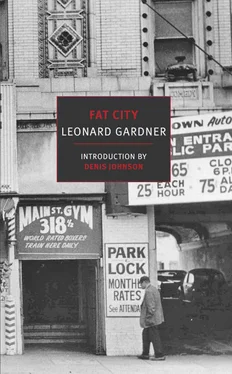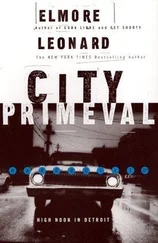Leonard Gardner - Fat City
Здесь есть возможность читать онлайн «Leonard Gardner - Fat City» весь текст электронной книги совершенно бесплатно (целиком полную версию без сокращений). В некоторых случаях можно слушать аудио, скачать через торрент в формате fb2 и присутствует краткое содержание. Год выпуска: 2015, Издательство: NYRB Classics, Жанр: Современная проза, на английском языке. Описание произведения, (предисловие) а так же отзывы посетителей доступны на портале библиотеки ЛибКат.
- Название:Fat City
- Автор:
- Издательство:NYRB Classics
- Жанр:
- Год:2015
- ISBN:нет данных
- Рейтинг книги:5 / 5. Голосов: 1
-
Избранное:Добавить в избранное
- Отзывы:
-
Ваша оценка:
- 100
- 1
- 2
- 3
- 4
- 5
Fat City: краткое содержание, описание и аннотация
Предлагаем к чтению аннотацию, описание, краткое содержание или предисловие (зависит от того, что написал сам автор книги «Fat City»). Если вы не нашли необходимую информацию о книге — напишите в комментариях, мы постараемся отыскать её.
Fat City — читать онлайн бесплатно полную книгу (весь текст) целиком
Ниже представлен текст книги, разбитый по страницам. Система сохранения места последней прочитанной страницы, позволяет с удобством читать онлайн бесплатно книгу «Fat City», без необходимости каждый раз заново искать на чём Вы остановились. Поставьте закладку, и сможете в любой момент перейти на страницу, на которой закончили чтение.
Интервал:
Закладка:
“Now what they going to do, mow the grass?” he said after the three vehicles had parked and the workmen were climbing down from the cabs.
“Pick up trash, I guess,” said a tanned, wrinkled man sitting near him in the shade.
Chains rattled, tailgates dropped, tools were dragged over truckbeds. The workmen entered the park with axes and chain saws.
“Must be a diseased tree,” said Tully, and a man with a scab down the bridge of his nose announced: “Tree surgeons. Probably a diseased tree.”
The last day haul had departed for the fields hours before. There were perhaps forty men reclining on the grass — gaunt night sleepers in coats, and farm workers in shirt sleeves, unhired at the morning shape-up. Two men and a woman in overalls rose from under the tree where the workmen stopped.
“Tree surgeons,” shouted the man with the scab after the rope starter had been pulled on the first chain saw. Roaring and sputtering like an outboard motor, the saw dug into the tree. In a moment another saw was roaring on the other side of the park. Ropes were thrown up into the foliage, sawdust flew, the trees swayed, tilted over, cracking, and fell with a rush of green leaves and a crash of branches. Men were rising, shambling away, and one after another the trees they had rested under came crashing down. Billy Tully remained propped up on his elbows, his legs flat on the lawn, until the crew reached his tree. He got up with the others, everyone surly and argumentative, walking away while a workman called after them.
“Hey, move your buddy.”
An inert man remained behind unresponsive to prodding feet.
“He’s no buddy of mine,” said Tully.
“He won’t be anybody’s buddy if he don’t move.”
“That’s your problem.”
“He’s breathing,” said the other workman.
The man was lifted up at the knees and shoulders, head hanging sideways, mouth open, sockless ankles and thin white shins dangling. He was pulled in opposite directions, his legs were dropped, he was dragged on his rear as the man holding him at the armpits stumbled backward. Again he lay on his back. Exchanging accusations, the two workmen once again grasped the slack limbs and carried him out of the shade.
Tully went back to the heat of his room. Barefoot and shirtless on the bed, he read a Male magazine and dozed to the sound of the saws a block away. They roared all day. By mid-afternoon, when returning laborers were arriving from the farms and Tully strolled back to the park, all the shade trees were down. Many of the trunks had been cut into sections and much of the foliage was gone. Across the park, as on the days that followed — when the trunks and limbs and stumps had all been cleared away and the patches of bare earth seeded — men lay lined in the elongated shadows of the palms and out in the glare of the sun.
14
Ernie and Faye Munger moved into three rooms on the ground floor of an old, three-story, white shingle apartment house. The kitchen faced onto garbage cans and lawn chairs in a back yard enclosed by a hedge, and dishes occasionally vibrated in the cabinet from a motor idling in a garage beyond the wall. Faye’s mother, perpetually smiling and exclaiming, her green eyes wide open and fearful, came and hung curtains. She treated Ernie with an awkward deference, her disappointment evident in sidelong looks, and he spoke to her in a polite son-in-law cant intended to convince her of his exceptional qualities.
In the curtained shadows he slept late, waking to find Faye, often nauseous, already up and dressed, his mornings not the times of sensual indolence he had imagined. At night he phoned the apartment from the station, and if Faye did not answer he called her parents’ house, where he invariably reached her, the ensuing conversations interrupted by customers, the receiver left on the desk while he slopped a wet rag over windshields, decided if a deficiency of oil was worth mentioning, peered into radiators but left the filling of them for another time and place. By the time he had locked up and driven home, Faye was usually asleep. They made love in the heat of the day.
Often they were visited by Faye’s friend, Norma Panelli, who discussed with Faye in the kitchen the fortunes of various couples, the girls’ voices at times sinking to whispers. To Norma Ernie spoke little, in order to discourage too soon a return.
With Faye crushed against him, he drove between the flat hot fields to Lodi or Tracy or Modesto, where they turned around to come back. He threw her into Oak Park Pool, swam to her underwater with lascivious fingers, stood on his hands with only his long white feet above the surface, ran off the high board and belly-flopped from the low, and with eyes stinging from chlorine, lay down panting beside her on the hot wet cement. When she walked between the pool and the dressing room his was not the only head that turned to watch. Coming home from these swims he was often ill-tempered and taciturn. One afternoon a car cut in front of them, the driver looking back as Ernie, brandishing a middle finger, filled the intersection with curses.
“You better be careful,” Faye warned.
“Careful of him? He’s just a sack of shit!”
“Stop doing that! He’s liable to see you.”
“I want him to see it! He’s the one better be careful.”
In the apartment, Ernie continued to brood over the incident, wondering: who does she think she married? And it seemed that she neither knew nor respected him, that she denied the very basis of his personality.
By the next day the occurrence had lost its significance. She was a girl, after all, and could have no sure sense of who he was. He forgave her, for that incomprehension itself attested to the uncommonness of his kind. It was enough that she love the part of him she knew; the other needed nothing from anybody. I don’t give a rat’s ass, was his motto. It was not comprehension he wanted, only her awareness that he was not like anyone she had known before. But it was as if what distinguished him was what she did not perceive. At times as he lay in bed listening to her breathing, a fear came over him that after marriage death was the next major event.
Sometimes he was euphoric; he rewarded her with bouts of ardor, gaining energy as hers was depleted. At meals he jiggled his legs. In the midst of a conversation he might suddenly drop to the floor and begin doing pushups.
“You’re the most nervous guy,” Faye said as Ernie was absorbed in rolling his neck while thoroughly masticating a raw carrot. “When you relax you really relax, but when you’re just sitting around you’re always moving.”
“I’m exercising,” he stated through the uproar in his jaws. “Most people neglect their necks.”
“I don’t mean just that. Look how you’re chewing.”
“That’s how to get the most out of a carrot.”
He was stimulated, he was pleased, yet at times he gazed at her for long moments, as if to gain by concentration some final elusive dominion. He would reach out and fondle her, amazed still at the breadth of his license. He buried his face in her, explored, examined, turned her about. I’ve liberated her, he told himself, yet was sometimes assailed by a strange sickening excitement and wondered if it were he who deserved the credit.
“I don’t want anybody but you,” he declared.
“I don’t ever want anybody but you,” she responded.
But Ernie felt no different. “I really mean it.”
“I do too.”
“I mean I never will.”
“Me neither.”
But he wondered if she would have said it without his saying it first. Often she told him she loved him, but that was not enough, even if it were true. She must have loved others before him, and where were they now? She had married him, but had there been any choice? What if she had never met him? Would it all have happened the same way with somebody else? When she amused herself one day with his hair, parting it and combing the sides down instead of upward and back, he felt he was not the man she wanted, and respected her less for her taste.
Читать дальшеИнтервал:
Закладка:
Похожие книги на «Fat City»
Представляем Вашему вниманию похожие книги на «Fat City» списком для выбора. Мы отобрали схожую по названию и смыслу литературу в надежде предоставить читателям больше вариантов отыскать новые, интересные, ещё непрочитанные произведения.
Обсуждение, отзывы о книге «Fat City» и просто собственные мнения читателей. Оставьте ваши комментарии, напишите, что Вы думаете о произведении, его смысле или главных героях. Укажите что конкретно понравилось, а что нет, и почему Вы так считаете.












